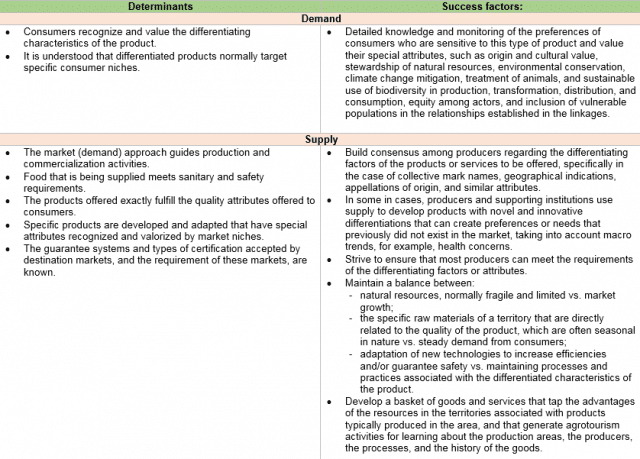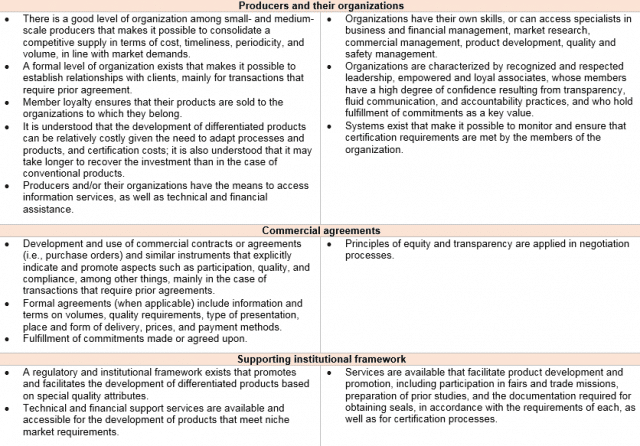On this fifth note related to commercialization strategies that add value and facilitate market access for agricultural producers, we will share the third suggested strategy, commercial linkages for differentiated products.
On this fifth note related to commercialization strategies that add value and facilitate market access for agricultural producers, we will share the third suggested strategy, commercial linkages for differentiated products.
Proposed definition:
An articulation of formally established organizations of producers of raw materials, fresh or processed products, that are differentiated, have third-party certification, have segments and niches sensitive to their attributes, long or short distance between producers and end-consumers, connected in many cases by specialized channels, be they local, regional, national, or international, with close relationships, and with or without prior agreements.
The main agents that drive these chains are informed consumers who are sensitive to certain special attributes of quality, who generate market niches that become increasingly specialized, and that correspond both to lifestyle and to income level. The public sector is involved through its work as a regulatory body (departments that deal with intellectual property, trademarks, records), and in some cases as an operator (country brand, appellation of origin, geographical identity, family agriculture seals in the Southern Common Market – MERCOSUR). Certifying entities are other relevant actors because they endorse the special attributes of a given product or the use of processes that the supplier promotes to consumers; these entities gain importance to the degree that commercialization chains are longer and mobilize and trade more international products.
Based on the analysis of multiple examples a group of determinants and success factors were identified. These are summarized in the following table.
Table: Supply chains linkages, Commercial linkages for differentiated products
This strategy would help commercialize substantial volumes of differentiated products for organizations that have a certain degree of development and financial capability; therefore, it cannot be considered an alternative for all producers. The alternatives shared in this strategy guarantee the quality and safety, as well as good management of resources and inputs, allowing the differentiation by origin; specific distinctive seals; environmental and ecosystem management, and ethical considerations.
More information on the proposed strategies will be available in the following weeks through the publication “Commercialization strategies that facilitate market access for agricultural producers” which could be found at IICA´s website. This document seeks to foster institutional and commercial innovation to create more linkages and increase producers’ participation in markets with commercialization strategies that enable them to identify, understand, and internalize consumers’ demands so they can develop processes that add value to, and earn higher incomes for their products. It discusses and recognizes the diversity of agricultural chains and the actors who participate in them, as well as the challenges and opportunities that emerge in those contexts.
Besides detail information on the proposed strategies, the document includes information of more than 50 cases, and a self-evaluation guide that can be used by technical personnel working in supporting agencies, individual producers, or leaders of producer organizations to evaluate short supply chains, supply chain linkages, and commercial linkages for differentiated products.
If you would like to review our previous notes related on this topic you can access them following this link.
More information: daniel.rodriguez@iica.int
*The opinions expressed in this newsletter are those of the authors and they do not reflect the position of the Institute on the topics presented.
*This post appears in the IICA Delegation in the USA Newsletter – September – December 2016













